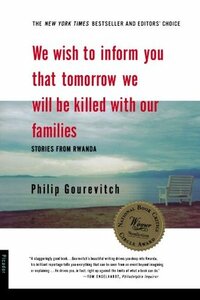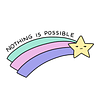Take a photo of a barcode or cover
651 reviews for:
We Wish to Inform You That Tomorrow We Will Be Killed with Our Families
Philip Gourevitch
651 reviews for:
We Wish to Inform You That Tomorrow We Will Be Killed with Our Families
Philip Gourevitch
I was 3 when the Rwandan genocide happened. Even later in life, I still knew next to nothing about the reality of what happened in this small Central African country. Gourevitch has an astonishing piece of literary journalism here; I couldn't put this book down, despite the absolute atrocities he shared, because his writing is so compelling and so gripping. The truth of international ignorance is heavy, but so important to read. When we as a world say "never again," yet we turn a blind eye when "again" happens, where is our humanity?
This book had so many 5 star ratings that It makes me wonder what I am missing. After watching The Act of Killing, The Look of Silence, and Shoah I know genocide can be handled with sensitivity yet unflinching realness that helps illuminate the darkness. How can so many people be murdered by their machete-wielding neighbors in 100 days? This book really didn't answer that question. It does explain the aftermath and all of its complexities and documents the bungled international response. But for me it raised more questions than it answered.
An important book about an important event in history. A lot of first hand accounts from those that were there.
However, it is, in my opinion, poorly written and poorly put together. There is too much, what I'd call filler, meaningless content that doesn't push the narrative forward. I found myself bored by some of Gourevitch's tangents and conversations that only served to glorify certain individuals.
Overall a book everyone should read...even if it's a struggle at times.
However, it is, in my opinion, poorly written and poorly put together. There is too much, what I'd call filler, meaningless content that doesn't push the narrative forward. I found myself bored by some of Gourevitch's tangents and conversations that only served to glorify certain individuals.
Overall a book everyone should read...even if it's a struggle at times.
I walked out of Hotel Rwanda and straight into the bookstore to buy this, which I'd been fingering (no, not like that you lech) for years. Gourevich is clear and concise about the history of Rwanda, the conditions (fostered by the Dutch and others) that led to the factional "racism" (if you want to call it that: the racial classifications were designated by outsiders) that had been obvious for years, and the specific events that led up to one of the quickest, most effective, mass-participation genocides in history. He also details the events of that time, and the lingering effects a year later, when he visited the country. He remains an outsider, but does not avoid exploring the effect the story has on him. As much as I like journalists to be neutral, neutrality in this circumstance would feel like a lie. He does all this in an extremely compelling style. I rarely get engaged in history books, and while the drama of the subject certainly helped it was his thorough and personal exploration of the extremity of this event that made this book so compelling.
Damn. I don’t know who recommended this book to me as it was in my TBR but it felt like the appropriate moment to read it because *gestures vaguely* and I learned a lot like I vaguely knew that a genocide happened in Rwanda at the same time as the one in my country but not the particulars about the history. And as much as I hate in general the role of people in power doing interviews and benefiting from the people that suffer I think this was done well (I haven’t googled this book to see if I’m correct). But in this point in time the parallels between this book and real life are crazy and I couldn’t keep from nodding my head along to like the 5 chapters about the position the western world took during this genocide and the uselessness of foreign aid. Was there moments where I had to put the book down and breath? Yes there are horrible moments in the book. But guess? what that’s what genocide is.
informative
sad
slow-paced
challenging
dark
emotional
informative
reflective
sad
tense
medium-paced
After just over a month, I've finished it. This is an intense book, one that can't be sped through without considerable thought. It was difficult not to feel outrage at the lack of attention from the wider global community ("Rwanda does not have oil", says one survivor), and it was difficult to read through the litany of reasons why the killing continued well past the genocide in 1994. It was difficult to keep everyone straight, from where people fled, to when they returned, to the leaders and military/militia/aid groups all scrambling about during and after the genocide. It was difficult to imagine people returning home and being expected to co-exist peacefully with the people who had murdered entire families - sometimes even their own. The story of Rwanda is not finished. There is a long road ahead, and Gourevitch examines why that is the case - and why, even though we promise "never again", it does happen - again. Be prepared for a very thorough, very intense look at Rwanda beyond the premise of "Hotel Rwanda." If you think you know the story - look again. Very closely.
Primo Levi, survivor of the Holocaust, is quoted rather poignantly at the start of chapter 18: "If there is one thing sure in this world, it is certainly this: that it will not happen to us a second time" (1958, Survival in Auschwitz).
And then, he is later quoted, "It happened, therefore it can happen again; this is the core of what we have to say. It can happen, and it can happen everywhere" (1986, The Drowned and the Saved).
The question now is: will we do something about it next time?
Primo Levi, survivor of the Holocaust, is quoted rather poignantly at the start of chapter 18: "If there is one thing sure in this world, it is certainly this: that it will not happen to us a second time" (1958, Survival in Auschwitz).
And then, he is later quoted, "It happened, therefore it can happen again; this is the core of what we have to say. It can happen, and it can happen everywhere" (1986, The Drowned and the Saved).
The question now is: will we do something about it next time?
I had to read this book for a course in university. It helped to change the plans I had made for my life. Looking at the genocide in Rwanda through the eyes of the author was incredibly poignant and eye-opening.
I had never heard about the Rwandan genocide before I taught students from Rwanda, which is completely bizarre to me. I learned about the Holocaust countless times in primary and secondary school, yet the Rwandan genocide is left out of our curriculums. This book does a good job of explaining the history and personal narratives of what happened in Rwanda. However, I do think that much has happened in the 20+ years since it’s publication that you should research after finishing. All in all, an important read about this tragedy in Africa.




